Abstract. Past research exploring the factors that contribute
to posttraumatic growth (PTG) among breast cancer survivors has yielded
mixed results, particularly regarding the role of social support. Some
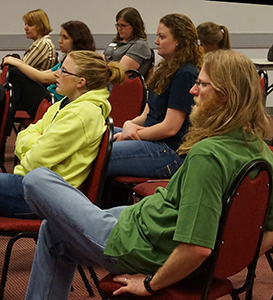 studies have found a positive correlation between social support and PTG
(e.g., Schroevers et al., 2010) whereas other studies have found no
relationship at all (Cohen & Numa, 2011; Weiss, 2004). Furthermore, some
research suggests that certain subtypes of social support (e.g.,
emotional vs. instrumental) may contribute to the development of PTG
more so than others (Nenova et al., 2013). Additionally, little is known
about the relationship between the provision of support to others and
PTG. While research has found that providing social support to others is
associated with less depression, greater
self-efficacy, and higher
scores on measures of overall well-being (Piferi & Lawler, 2006), there
have been no quantitative
studies to date that have specifically
examined the relationship between providing social support to others and
PTG. This presentation will provide an overview of the theoretical
construct of posttraumatic growth and the existing literature related to PTG among breast cancer patients and survivors. The presentation will
also discuss the relevance of this writer’s current research with
regards to addressing the relationship between received emotional and
instrumental support and PTG as well as the relationship between giving
emotional and instrumental support and PTG in the breast cancer
population.
studies have found a positive correlation between social support and PTG
(e.g., Schroevers et al., 2010) whereas other studies have found no
relationship at all (Cohen & Numa, 2011; Weiss, 2004). Furthermore, some
research suggests that certain subtypes of social support (e.g.,
emotional vs. instrumental) may contribute to the development of PTG
more so than others (Nenova et al., 2013). Additionally, little is known
about the relationship between the provision of support to others and
PTG. While research has found that providing social support to others is
associated with less depression, greater
self-efficacy, and higher
scores on measures of overall well-being (Piferi & Lawler, 2006), there
have been no quantitative
studies to date that have specifically
examined the relationship between providing social support to others and
PTG. This presentation will provide an overview of the theoretical
construct of posttraumatic growth and the existing literature related to PTG among breast cancer patients and survivors. The presentation will
also discuss the relevance of this writer’s current research with
regards to addressing the relationship between received emotional and
instrumental support and PTG as well as the relationship between giving
emotional and instrumental support and PTG in the breast cancer
population. |
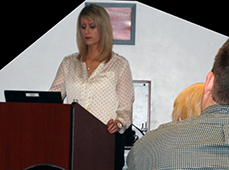

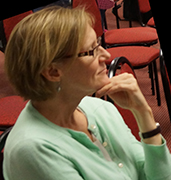
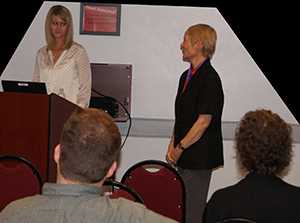
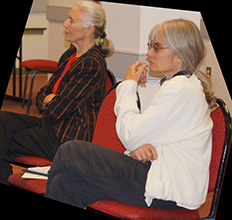
 studies have found a positive correlation between social support and PTG
(e.g., Schroevers et al., 2010) whereas other studies have found no
relationship at all (Cohen & Numa, 2011; Weiss, 2004). Furthermore, some
research suggests that certain subtypes of social support (e.g.,
emotional vs. instrumental) may contribute to the development of PTG
more so than others (Nenova et al., 2013). Additionally, little is known
about the relationship between the provision of support to others and
PTG. While research has found that providing social support to others is
associated with less depression, greater
self-efficacy, and higher
scores on measures of overall well-being (Piferi & Lawler, 2006), there
have been no quantitative
studies to date that have specifically
examined the relationship between providing social support to others and
PTG. This presentation will provide an overview of the theoretical
construct of posttraumatic growth and the existing literature related to PTG among breast cancer patients and survivors. The presentation will
also discuss the relevance of this writer’s current research with
regards to addressing the relationship between received emotional and
instrumental support and PTG as well as the relationship between giving
emotional and instrumental support and PTG in the breast cancer
population.
studies have found a positive correlation between social support and PTG
(e.g., Schroevers et al., 2010) whereas other studies have found no
relationship at all (Cohen & Numa, 2011; Weiss, 2004). Furthermore, some
research suggests that certain subtypes of social support (e.g.,
emotional vs. instrumental) may contribute to the development of PTG
more so than others (Nenova et al., 2013). Additionally, little is known
about the relationship between the provision of support to others and
PTG. While research has found that providing social support to others is
associated with less depression, greater
self-efficacy, and higher
scores on measures of overall well-being (Piferi & Lawler, 2006), there
have been no quantitative
studies to date that have specifically
examined the relationship between providing social support to others and
PTG. This presentation will provide an overview of the theoretical
construct of posttraumatic growth and the existing literature related to PTG among breast cancer patients and survivors. The presentation will
also discuss the relevance of this writer’s current research with
regards to addressing the relationship between received emotional and
instrumental support and PTG as well as the relationship between giving
emotional and instrumental support and PTG in the breast cancer
population.